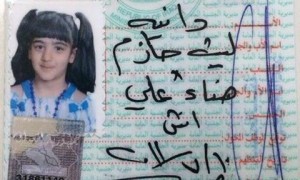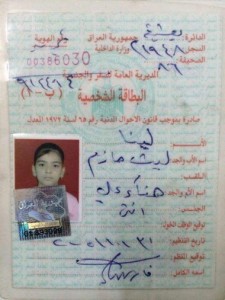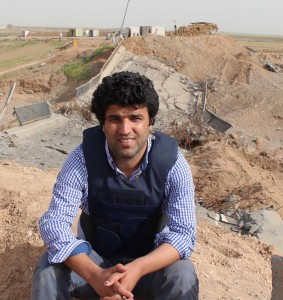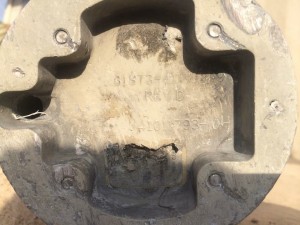Was lethal airstrike at Fadhiliya, Iraq aimed at Islamic State attacks in vicinity of nearby Canadian troops? Library image shows personnel departing for Iraq, November 2014 (Canadian MoD/ Cpl LS Eduardo Jorge)
Nine months and 4,000 airstrikes into the international coalition’s air war against Islamic State, the US-led alliance has to date only conceded the “likely” non-combatant deaths of two children in a November 2014 airstrike.
At Airwars we believe this to be a major under-reporting of the facts. Claims of up to 740 civilian deaths have already been published by local and international media, by monitoring groups and by affected communities.
Verifying these claims can be extremely difficult. Most areas being bombed by the coalition are occupied by Islamic State. Civic society has often collapsed, and local people live in fear of retaliation for speaking out. Even so, evidence linking the coalition to civilian deaths can often be compelling.
Airwars has been speaking with journalist Fazel Hawramy, who with his US-based colleague Raya Jalabi recently published a major story with the Guardian about a family of five killed near Mosul in early April, in a likely coalition airstrike.
We began by asking the Irbil-based reporter what had led him to investigate this particular event:
Fazel Hawramy: Since the coalition strikes started last August, when ISIS was closing in on Irbil, there have been reports of civilian casualties in areas under Islamic State control. You see many photos of children badly wounded, sometimes dead children and civilians, published by ISIS-affiliated tweeps on Twitter from Mosul and surrounding areas.
The problem for me with that as a journalist is that it’s very difficult to verify the allegations in these tweets. Because there’s no way that I can access the locals in these areas.
On this occasion, I was online a few weeks ago and a friend shared an update from Facebook from another friend of his saying there’d been a strike in the vlllage of Fadhiliya north of Mosul. And he gave some descriptive details of what happened there. I contacted the guy sharing, who was ready to help with contacting people on the ground. This was a village still under ISIS control, by the way.
All the evidence pointed to a family in Fadhiliya having been hit by a coalition airstrike. Through my contact I was able to speak to some people in the village. Of course they didn’t want to be named in the piece because ISIS is still there – and if they don’t like something it may put these peoples’ lives in danger. So I agreed to give them anonymity so that they could talk candidly.
Airwars: Do you think, based on your findings for the Guardian, that we should be taking more seriously other claims of civilian deaths from alleged coalition strikes?
Hawramy: Definitely. In this particular case I was fortunate in that I speak Kurdish, so I was able to speak with people in the village and question each of them for around half an hour about the details of the incident.
There are of course civilian casualties from coalition strikes. The problem always for journalists is to get access to the people. And unfortunately the danger to civilians who are under ISIS control is so great that I sometimes feel uncomfortable putting people’s lives in danger.

Danya Laith Hazem, killed in a likely coalition airstrike near Mosul on April 4 2015 (Courtesy of family via Guardian)
But on this particular occasion people in Fadhiliya were happy to talk about the event. Their only condition was that they shouldn’t be named. There are casualties [being caused] not only by the coalition but from the Iraq Army, the Air Force – there have been many casualties. I’ve interviewed people in Kirkuk in [IDP] camps who’ve said that parts of their families were obliterated by the Iraqi Air Force. And clearly there needs to be more focus on this aspect of the war against ISIS.
Airwars: When you spoke with villagers in Fadhiliya, did you get a sense of how they viewed the fact that the coalition appears to be in denial about civilian deaths?
Hawramy: These villagers weren’t very well connected to the outside world in terms of the internet and so on. They’re aware of strikes being carried out around their area of Mosul, but aren’t necessarily aware of civilian casualties in other areas.
One issue I have with the data issued by CENTCOM is that on this particular occasion on April 4, they said there were strikes “near Mosul.” This was too general, making it really difficult to ascertain whether there was a strike near Fadhiliya. Fortunately my colleagues in Washington DC managed to confirm with them that there was a strike around Fadhiliya.
But when you read that press release by CENTCOM it’s really not clear. They just say “a strike around Mosul.” And Mosul is vast, involving three front lines between the Kurds and Islamic State. They could be more co-operative in providing information on where their strikes actually occur.
Airwars: What about the affected family themselves – what do they want? An apology, a recognition that five relatives were killed? What would help them?
Hawramy: I didn’t speak directly with the family itself. I have spoken with members of the extended family. I was trying to talk with the two girls that were wounded [in the alleged airstrike]. But then I was told by people in Fadhiliya that they were in such a state of mind that it would be difficult for them to discuss what had happened that early morning.

Identity document of Lina Laith Hazem, 16, wounded in Fadhiliya air strike April 4 (Courtesy of family via Guardian)
However, from speaking with their MP in the Iraqi parliament – and with the extended family – I understand that they want acknowledgement of what happened in Fadhiliya, and also compensation for the loss and pain that the coalition caused to that family.
The olive tree farm that this family owns is very big, and some distance away from Fadhiliya. And I was interested to know whether there had been any Islamic State forces on their property that night. The four people I spoke with all said no, there were no ISIS units around the farm – although they are present in the village itself where they have a small base of up to 12 fighters.
Airwars: The Guardian was able to get confirmation from CENTCOM that it had in fact carried out an airstrike at Fadhiliya on the day in question. Based on the available evidence, is it your view that the international coalition did cause these civilian deaths?
Hawramy: Based on CENTCOM’s confirmation that there was an airstrike around Fadhiliya – and talking to villagers and to their MP – I am pretty convinced.
The MP, Mala Salim Juma Mohammad, a member of the Shabak party, has spoken with the Iraqi Defence Ministry who were confident that they did not launch the air strike. He’s also been to the US Embassy in Baghdad who say they’re investigating the case.
I also have a source in the Iraqi Air Force who told me that they do not carry out airstrikes north of Mosul in the areas around Fadhiliya. The village is very close to Bashiqa Mountain, which is where the Canadian soldiers are based and where one of them died a few months ago in a ‘friendly fire’ incident. And there was recent fighting on that mountain between the peshmerga and ISIS.
So based on the location of the village – and the fact that the peshmerga are constantly calling in coalition airstrikes – I think I’m pretty confident that this was carried out by the coalition.
Airwars: Where next for your investigation into this incident?
Hawramy: I did manage to obtain photographs of fragments of a missile that was used in the strike, and they’re presently being analysed.
If they come back as positively identifying [weapons used by the coalition], that adds weight to the attack having been carried out by coalition forces. I also plan to speak with villagers again to see what happens with this case moving forward.
Follow Airwars on Twitter – now also tweeting in Arabic


